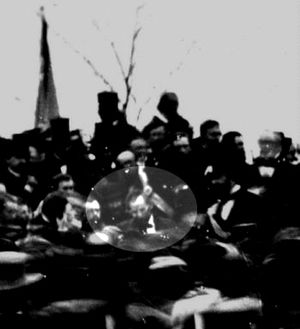 Any critic who’s forced to write short can’t help but find inspiration in the Gettysburg Address. Has anyone said more in fewer words? On the other hand, as Aaron Copland said of the music of Mozart, “Any incommensurable thing sets up within us a kind of despair.” What can a lesser writer possibly hope to learn from the Gettysburg Address beyond the painfully obvious fact that he’s not Abraham Lincoln?
Any critic who’s forced to write short can’t help but find inspiration in the Gettysburg Address. Has anyone said more in fewer words? On the other hand, as Aaron Copland said of the music of Mozart, “Any incommensurable thing sets up within us a kind of despair.” What can a lesser writer possibly hope to learn from the Gettysburg Address beyond the painfully obvious fact that he’s not Abraham Lincoln?
This is how Copland put it in an essay called “At the Thought of Mozart”:
Paul Valéry once wrote: “The definition of beauty is easy: it is that which makes us despair.” On reading that phrase, I immediately thought of Mozart. Admittedly, despair is an unusual word to couple with the Viennese master’s music. And yet, isn’t it true that any incommensurable thing sets up within us a kind of despair. There is no way to seize the Mozart music. This is true even for a fellow-composer, any composer–who, bring a composer, rightfully feels a special sense of kinship, even a happy familiarity, with the hero of Salzburg. After all, we can pore over him, dissect him, marvel or carp at him. But in the end there remains something that will not be seized. That is why, each time a Mozart work begins–I am thinking of the finest examples now–we composers listen with a certain awe and wonder, not unmixed with despair. The wonder we share with everyone; the despaire comes from the realization that only this one man at this one moment in musical history could have created works that seem so effortless and so close to perfection. The possession of any rare beauty, any perfect love, sets up a similar distress, no doubt….
That’s how I feel about the A Major Piano Concerto–and the Gettysburg Address. Mostly they inspire and console me, but they also remind me of the terrible, irreducible fact of human inequality, which isn’t quite what Lincoln had in mind. We are not what he was, or what Mozart was. All we can do is be who we are–and aspire, on occasion and insofar as possible, to be something better, something more.
* * *
Vladimir Horowitz plays the slow movement of Mozart’s A Major Piano Concerto, K. 488:
Charles Laughton recites the Gettysburg Address in Ruggles of Red Gap, filmed in 1935:
